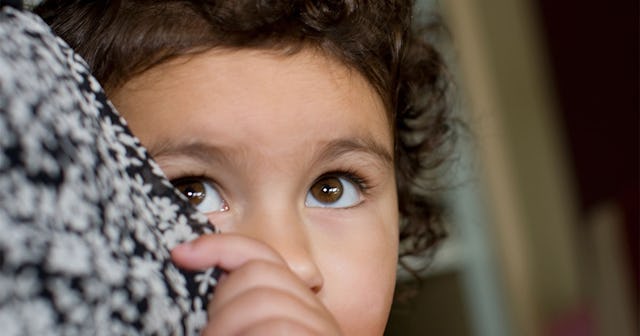A Reminder Not To Force Your Kids To Hug Others During the Holidays

‘Tis the season for gathering with our nearest and dearest to celebrate the holiday season, and there are likely numerous stops on your holiday calendar. But wherever you are, whether you’re posing for a family photo, walking in (or out) the front door, or sitting around the dining table, our kids shouldn’t be required to touch relatives — because boundaries are important.
For years, we’ve read how important it is to teach our kids consent and body autonomy. But how does this translate to seeing Grandma or hanging out with their favorite cousins? What if our children aren’t comfortable with hugging, for example? Here’s what two mental health experts had to say.
Dr. Jennifer Wolkin, a neuropsychologist, told Scary Mommy, “When a child is forced to touch relatives, even hugs, they can start to believe that they aren’t in control of their own body. When we command ‘hug aunt so-and-so’ we aren’t asking for consent, and make it seem as though it doesn’t matter whether or not the child is comfortable.”
You might be wondering what the big deal is. Why can’ t we tell our child to give their great aunt a peck on the cheek or offer Grandpa a hug? Dr. Jen, as she’s known, tells us, “We don’t want this to ever translate to a situation with a predator in which the child thinks they are absolutely obligated to comply. In general, we need to send the message to our children that physical touch is never elicited by coercion.”
She adds that we can confuse our children when we have taught them that their body belongs to them, but then we turn around and give exceptions to relatives. She wants us to know that “we have to ‘normalize’ children being able to say NO, and that NO will mean something.”
Why is it so tough to emphasize, especially with relatives during the holidays? Old school thinking teaches us that “giving some sugar” to a relative is a sign of tradition and respect. A child who denies a relative physical affection may come across as defiant or rude. We have to let this go — and instead, help stand up for our children who don’t want a hug, kiss, or to sit on a lap.
She suggests we talk to our kids prior to any holiday gatherings. We can lay out in advance about what they are and aren’t comfortable with, and promise them to always back up their choice. We can simply say, “We let Beth decide how she shows affection.” Or, “Aiden prefers high-fives over hugs.” Dr. Rachel Goldman says we need to talk to our kids about their “comfort levels” prior to the gathering. By having a plan, everyone is less stressed and more likely to enjoy the get-together.
Whatever our kids decide is what’s best. We don’t want to shame our kids for honoring their boundaries.
Thanks to COVID, our kids (and us!) may have spent a few years not showing physical affection to people. Walking into a holiday gathering with family can be “new and potentially overwhelming.” Goldman suggests “reassuring” our kids, and perhaps ourselves, that it’s OK to have new boundaries and feelings. It’s been a rough (almost) two years.